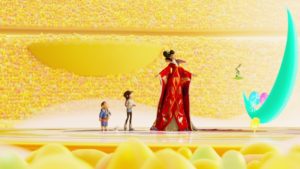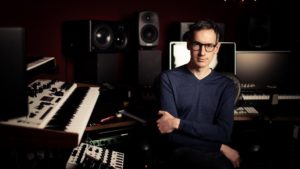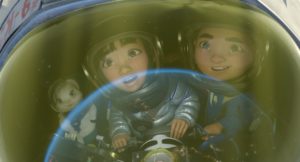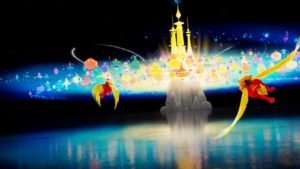
A young girl sets off on a magical adventure in Over the Moon, an animated musical streaming on Netflix starting October 23. Directed by Academy Award-winning animator Glen Keane, the movie takes its inspiration from Chinese tales about Chang’e, an immortal moon goddess.
“It’s like the Chinese version of Father Christmas,” according to Steven Price, the movie’s soundtrack composer. He found out about the project when Editor Edie Ichioka told him how much fun she was having working with Keane.
“I got to meet with Glen via computer,” Price recalls. “He’s one of those directors who doesn’t particularly talk about music, but about feelings instead, which is what this movie is about: feelings and emotions.”
Price first read the script and saw concept art of the main characters and settings. He also spoke with producers Gennie Rim and Peilin Chou about treating what is an important part of Chinese culture with accuracy and respect.
“What we didn’t want was a clichéd, Westernized version,” he said. “My job was to find a way so that China was in the music all the time, not just a feature of it. Obviously, I researched the scales and instruments used in China, but rather than using them as bits of color, I tried to make them part of the texture of the music.”
In his studio, Price manipulated recordings of traditional instruments like the guzheng, stretching its notes so it would become part of the sound of Lunaria, the landscape on the moon where much of the movie takes place. He used the erhu, a stringed instrument, to connect with the melancholy fate of Chang’e, doomed to an eternity apart from her lover Houyi.
Children across Asia grow up hearing stories about Chang’e and Houyi. In Screenwriter Audrey Wells‘ version, Fei Fei is a young girl in a modern-day town like Wuzhen who is grieving over the death of her mother. She’s convinced that Chang’e can help in some way.

Nine new songs by Christopher Curtis, Marjorie Duffield, and Helen Park help explain how Fei Fei and her possible new brother Chin build a rocket and journey to Lunaria on the moon. Having worked with director Edgar Wright on films like Baby Driver and the new Last Night in Soho, Price had plenty of experience weaving his score around pop tunes, occasionally quoting from their themes to enhance a motivation or plot point.
But Price had never worked with someone like Keane, who is revered by animators for a career that includes creating Disney characters like Aladdin and The Beast, as well as an Oscar for collaborating with the late Kobe Bryant on Dear Basketball.
“Usually on a project with characters, say my first response is not quite hitting it,” Price says. “You can have all these weird conversations about whether it’s too major or too minor that don’t lead anywhere.
“But Glen would go, ‘When I was drawing this character, I was thinking of this,’ or, ‘The reason why the hair is like this is because she’s this sort of person.’ He sort of interpreted character through hair, or the way eyes looked. That gives you so much character information you can’t get any other way.”
Although he began composing themes in 2018, Price didn’t begin working on the score in earnest until this January. Sequences were still in various stages of completion. As he wrote, animators would be adding lighting and color to scenes. Occasionally, the changes would affect how he scored a scene.
“The first flight to Lunaria was a sequence I was terrified of,” Price reveals. “If you didn’t get this feeling of Fei Fei entering this magical dream world, then nothing after that was going to work. When I started writing, I had a melody that felt like it was the flight, but then Glen told me how Lunaria was actually going to look. Everything is lit as if from within, everything glistening. He described it as electricity passing through everything.”

Keane’s comments changed Price’s approach to the melody and how to harmonize it. He pushed different elements of the score, adding layers and introducing electronic instruments as the story expanded its vistas and palettes.
“There was one week where I went from writing the arrival on Lunaria to a sort of Sorcerer’s Apprentice piece as the jade rabbit mixes a potion, and then the next day trying to find music to make an alien lasso a frog that flew through space,” Price says, laughing. “Every day had these weird challenges of scale and totally crazy sequences that you somehow had to make feel like a flowing narrative.”
Intricate montages follow Fei Fei as she bicycles through her village and experiments with rockets, material that needed music to tie them together.
“Glen was very keen to get the energy for those sequences,” Price says. “He was always, ‘Her brain is fizzing, her brain is fizzing, you’ve got to make the music feel like that.’ He felt that her thoughts were overlapping all the time, so the music is overlapping too. A lot of rapid string playing, the lines crossing over and moving through bits of the orchestra. I had to find a level of controlled chaos in her mind.”
Price points to other challenges in the score, like a sequence set in the “Chamber of Exquisite Loneliness,” an exercise in “how you can make something feel empty, yet emotional at the same time.”
Covid-19 presented a different set of problems. The score for orchestra and choir was scheduled to be recorded at Abbey Road in London, following social distancing protocols. When that proved impossible, recording shifted to a studio in Vienna for seven days. Overdubs were recorded over three additional days in London.
“We couldn’t have the whole orchestra in the room at one time,” Price recalls. “We’d do the strings, then the brass and the woodwinds, then the choir, all in separate sessions. I was surrounded by scores, trying to remember how this was going to sound when all the layers were added. Meanwhile Glen’s listening in LA at 2 o’clock in the morning. He was there for every minute of every session, which really impressed me.”
Price worked with Re-recording Mixer Michael Semanick on the score and songs over a three-week period at British Grove Studios in London, with Skywalker Sound handling the dub. One of the composer’s regrets is that most viewers won’t be able to experience Over the Moon in theaters.
“Glen was always embracing the theatrical side of this,” he says. “And for me, there are moments when all the music surrounds you. The ‘Chamber of Exquisite Sadness’ is very much a Surround Sound moment, you feel as if the voice is spinning around you. Hopefully the movie will still get its time in theaters.”

Price’s film career includes winning a Best Original Score Academy Award for 2014’s Gravity. He’s also worked extensively in TV, winning two Emmy nominations for the Netflix series Our Planet. Recently he composed the score for the feature documentary, David Attenborough: A Life on Our Planet.
“The Attenborough project is a massive honor,” Price says. “This is his witness statement, this is him on camera talking directly to the audience. Often natural history shows are a lot of beautiful sequences of the world looking wonderful. This one gets dark, very intimate. It’s actually harrowing.”
Because Attenborough likes chamber music, Price wrote for a small group of strings with solos for piano, flute, clarinet, horn, and trumpet.
“Musically, my job was to support, to stay out of the way,” he explains. “I hope people get to see it. You’re never sure nowadays what will get watched.”
Price is finishing up Edgar Wright‘s Last Night in Soho, working again at Abbey Road.
“You realize that one of the things that you love about these places is how you bump into someone in the corridors,” Price says. “‘Oh, what are you doing?’ ‘I’m in the studio, come have a listen.’ All these connections happened that might lead you to something. They’re gone. I can’t even go into the studio to talk to my musicians now.
“Ultimately it’s not fun. All that community and spirit aren’t there at the moment, and it always feels one bad event will shut down everything again. Still, I’m enormously grateful I’ve been able to work at all in the last few months. A lot of people haven’t.”
You can check out Price’s work on Over the Moon on Netflix, starting October 23, but you can also check out one cue below.





